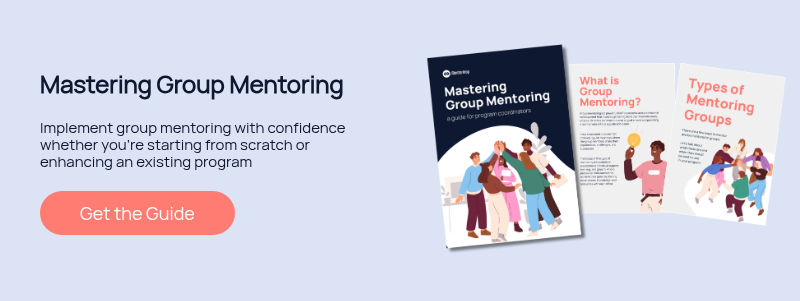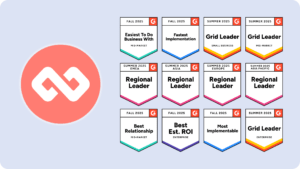What Are Mentoring Circles?
Mentoring circles are pretty simple: instead of traditional one-to-one mentorships where person A (mentor) sits down with person B (mentee) for a chat, mentoring circles involve a number of people (mentees), usually about 5 or 6, who discuss a topic of interest with one or multiple mentors or facilitators who have expertise or experience in that subject matter.
Mentoring circles combine the beauty of mentoring with elements of coaching and action learning.
Mentoring circles have been around for a while, but much like their other mentoring brethren, they are experiencing a revitalisation of sorts and are becoming increasingly popular as a tool to re-connect organisations and inspire people to learn, connect, and progress.
What Benefits Do Mentoring Circles Have Over One-to-One Mentorships?
Well, for lack of a more suitable phrase: mentoring circles simply enable a mentor to kill multiple birds with one stone i.e. they can share their experience and insights with more people, more quickly – benefitting more people.
It’s very unlikely that a problem or challenge one person is experiencing is unique to them. It’s more likely that that specific problem is being experienced by a number of people who are each seeking a solution.
So it makes sense to bring some of these people together to collectively explore and discuss the issue – while being mentored and guided by someone who has knowledge and experience in personally overcoming that problem: the mentor.
Mentoring circles also remove some of the potential awkwardness and anxiety associated with developing a one-to-one relationship. Group settings are great for introducing new ideas to people and making them feel comfortable about interacting.
They can also be a little more fun than traditional mentorships. Mentoring circles can involve some genuine group activity including role play and brainstorming. This type of group activity creates energy, camaraderie, and makes the mentoring experience an enticing one.
What Are the Cons Of Mentoring Circles?
The obvious and main drawback of mentoring circles is that they can result in groupthink. In an individual mentorship, the mentor is able to act as a counterbalance and in some cases, devil’s advocate to the mentee, which is what creates great outcomes. Groupthink stifles alternative opinions and counterbalances in favour of agreeance. And it’s a powerful force.
The way to overcome this potential problem is to be proactive in the way that set expectations and rules. Google is famous for its findings and focus on psychological safety – which they say is the most important aspect of high team performance – and which mitigates the likelihood of groupthink and its associated negative outcomes.
Mentoring circles can also result in an inability for the more quiet personalities to express their opinions and beliefs, with the more commanding and dominant personalities sometimes overpowering them.
This too can be overcome by instilling process and guidelines into the mentoring circle – whereby everyone has the opportunity to talk and express their opinions. A good mentor/moderator can also ensure that each individual is catered to and has the experience they desire/require.
You will also need to be more cognizant of the potential privacy concerns of certain participants – and set some ground rules around confidentiality – around what enters and exits the circle.
How Can You Use Mentoring Circles At Your Organisation?
How you use mentoring circles will inevitably depend on the goals of your mentoring efforts, the industry you operate in, and the make-up of your organisation.
Employees want to feel as though they are spending their work time wisely, so try to ensure that the connection between mentoring circle and work is tangible. You want the subjects to be hearty and actionable so that people feel the urge – and feel safe – to attend.
There are some core mentoring circle groups that all organisations should make available to their people:
You may have distinct industry common challenges that mentoring circles could help your people overcome or transition through as well.
As long as there is a small and willing group of people who share a common goal or pursuit – you have a mentoring circle.
Beyond these, you can get as granular as you would like in your mentoring circles, choosing to talk about how an engineer can manage a team etc.
How these mentoring circles are conducted will vary by organisation and circle, but the core process remains largely the same…
How Do Mentoring Circles Work?
Typically, mentoring circles work and evolve something like:
- A mentoring circle program coordinator creates a framework for how the process and each session will work
- The mentoring circle coordinator either creates mentoring discussion topics; asks potential participants (mentees) for pain points or aspirations; or asks potential mentors for areas of expertise they would be keen to share in a mentoring circle.
- After topics are selected, each group/topic is scheduled to meet about once every month or two to discuss the topic at hand.
- This arrangement dissolves ends if/when the subject is covered comprehensively – with the option for some of the mentees to transition to a more traditional one-to-one mentorship with the mentor.
You can manage this entire process using dedicated mentoring software, or choose to run the circles and programs more manually.
How Can Mentoring Circles Benefit Your People?
Improved Performance
Happy and confident people are productive people. Positive interactions inspire confidence and psychological safety which improve performance. Both mentors and mentees also learn new applicable skills and problem-solving abilities.
Sense of Belonging & Affinity for the Organization
Mentoring circles help people feel a sense of belonging. In too many organisations today, people experience too little face-to-face interaction and feel siloed off from others. Feeling connected to other employees makes people feel connected to their organisation.
Lower Stress
Everyone is attempting to fight the good fight; both at work and at home. Mitigate the inevitable stresses and hardships of life as much as possible by giving people a safe and productive forum to discuss and solve these issues before they start impacting their lives and work even more.
How Can Mentoring Circles Benefit Your Organisation?
Improved Knowledge Sharing
Organisations spend millions of dollars trying to connect their organisation in a way that improves interaction and disseminates all the pent up knowledge being left on the sidelines. Mentoring circles are an easy and affordable way to harness your internal knowledge bank exponentially.
Improved Culture
Mentoring circles improve culture in two ways: 1) they allow mentors (typically more senior people) to lead by example and share cultural insights and 2) they connect people to each other which creates a more close-knit company where people can talk, share, disagree, and move forward together.
Lower Turnover
Increasing the satisfaction of your people and giving them the tools to keep progressing and growing will ensure they stay longer at your organisation – saving you millions in preventable turnover.
Higher Productivity
Your people want to be more productive and valuable, and you want them to be too!
Just as with all people programs, mentoring circles are not a silver bullet for all of your programs. But they are a powerful tool that you can implement at your organisation to provide your people with a forum – and group mentorship – for improving their careers, their lives, and in turn, improving your organisation.
Mentoring circles are the most efficient form of mentorship, which means more mentoring for everyone, which is always a good thing.
Ready to build your best mentoring program yet? Chat with one of our mentoring experts and get started!





